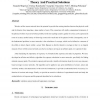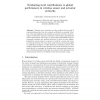155 search results - page 7 / 31 » Formal Theory of Noisy Sensor Network Localization |
WINET
2002
13 years 7 months ago
2002
Wireless ad-hoc sensor networks have the potential to provide the missing interface between the physical world and the Internet, thus impacting a large number of users. This conne...
CDC
2008
IEEE
14 years 2 months ago
2008
IEEE
We develop a novel localization theory for planar networks of nodes that measure each other’s relative position, i.e., we assume that nodes do not have the ability to perform me...
DCOSS
2006
Springer
13 years 11 months ago
2006
Springer
Wireless sensor networks are often studied with the goal of removing information from the network as efficiently as possible. However, when the application also includes an actuato...
FORTE
2010
13 years 9 months ago
2010
Wireless sensor networks are typically ad-hoc networks of resource-constrained nodes; in particular, the nodes are limited in power resources. It can be difficult and costly to rep...
ICASSP
2009
IEEE
14 years 2 months ago
2009
IEEE
— We study the inversion of a random field from pointwise measurements collected by a sensor network. We assume that the field has a sparse representation in a known basis. To ...


